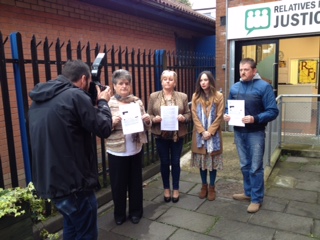
Human rights & victims support NGO Relatives for Justice (RFJ) has released correspondence from the Director General, and Deputy Director General, of the BBC that reveals the corporation does not have a policy that states presenters should wear poppies during early November’s ‘Remembrance week’. The correspondence also states that the matter is solely for individual presenters and that the wearing of a poppy is a voluntary act. The correspondence can be read here Letter from BBC Director General re Poppy
The symbol is very much a divisive issue here and many of those bereaved and injured by the state’s armed forces feel their views and experiences have been disregarded for decades. These families are now calling on the publicly funded broadcaster in the north to exercise leadership reflecting the views and sensitivities of the entire community by creating a neutral service where no contentious symbols are worn. It is hoped that the above appeal to the BBC hierarchy in Ormeau Avenue could help create a neutral service for all citizens. RFJ have urge local presenters to also consider the feelings of these families too when making a decision whether or not to wear a poppy.
RFJ Chairperson Clara Reilly said:
“The entire community funds the BBC through the license fee and this is about creating a neutral and acceptable public broadcasting service for that entire community. Currently this is not the case because of the wearing of the poppy.
JJ Magee, the brother of Anne Magee killed by loyalists, said: “We support the right of individual citizens who choose to wear a poppy despite the challenges it brings within a divided society and not least the killing of our loved ones by state forces and through collusion. However, we strongly feel that when it comes to a publicly funded body such as the BBC there should be a duty to ensure that its services broadly reflects the community it serves and this is not the case.
Tom McWilliams, brother of Paul killed by the British army, said “Many thousands bereaved and injured by state violence dread the November period when the poppy is a constant and a reminder when they switch on their television sets that their loss, their trauma, and their hurt is totally disregarded and disrespected while those very organizations responsible for the deaths of their loved ones are collectively remembered. This adds insult to injury not to mention they have to also pay for the insult through the license fee.”
Kathleen Duffy, the mother of Seamus Duffy killed by the RUC said: “Surely the state broadcaster must operate a practice that fosters inclusion as opposed to further causing harm, alienation and division; especially when we factor into the equation the context here in the north. We pay a license fee too and as a public body we feel that the BBC has not taken into account the views of the whole community.
“As families who have suffered directly at the hands of state forces, including through collusion, we feel that the decision to wear a poppy is taken with total disregard to our feelings. It simply ignores the facts about countless human rights violations and collusion by these same forces. How would the unionist community feel if presenters wore Easter Lilies? Some families view poppies as glorifying the killings of their loved ones by the state and through collusion.
Mary Kate Quinn, the niece of John Laverty killed in Ballymurphy by the British army, added: “Will the BBC issue a statement saying that the wearing of a poppy by presenters does not commemorate the RUC, UDR and the British army as part of Operation Banner and the conflict in the north?
“An argument often used to try and counter any opposition to the wearing of the poppy by the state broadcaster is the wearing of shamrock. This is no comparison at all.”
Concluding RFJ Chairperson Clara Reilly said:
“The correspondence makes it clear that the wearing of the poppy is a voluntary act. However, when we examined a sample of BBC NI television news and current affairs broadcasts over this past three decades there wasn’t one broadcast where a studio-based presenter at BBC NI had appeared on screen without a poppy.
“A BBC insider revealed that if a decision by a studio-based presenter not to wear a poppy were to arise they’d be asked to take annual leave. This comment, along with the evidence that shows no presenters appearing without a poppy, would seemingly contradict the BBC’s official position.
“In the absence of BBC NI executives exercising leadership and ensuring the corporation reflects and respects the views of the entire community we would appeal directly to presenters to consider the views and above all the feelings of the thousands of relatives we provide support to when deciding whether or not to wear a poppy.” ENDS











